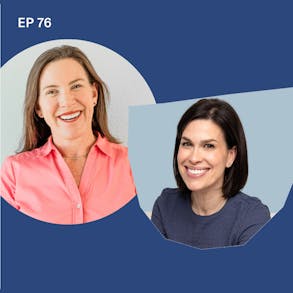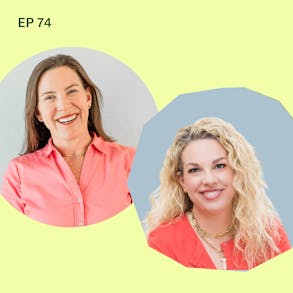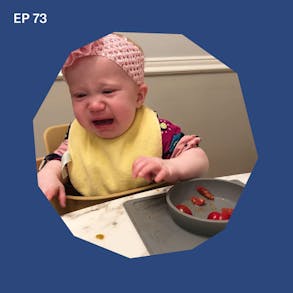How to Flavor, Season & Spice Your Baby's Food with Kanchan Koya, PhD
- Which spices are safe for babies, and which seasonings you’ll want to skip (and why)
- How spices support your baby’s health and development of their flavor palate
- What spices to add to kick the flavor up in your baby’s starter finger foods, even if you’re not a confident cook

LISTEN TO THIS EPISODE
Episode Description
Babies don’t have to eat bland food! In this episode, spice expert and cookbook author Kanchan Koya, PhD @chiefspicemama shares how to safely introduce seasonings and spices to your baby’s food. Learn which spices are safe, why they support health, and how to bring your family’s food culture into your baby’s diet from the start.

Links from this Episode
- Get Kanchan’s book Spice Spice Baby on Amazon here
- Visit Kanchan’s website for the Spice Spice Baby book here
- Follow Kanchan on Instagram @chiefspicemama
- Baby-Led Weaning with Katie Ferraro program with the 100 First Foods™ Daily Meal Plan, join here: https://babyledweaning.co/program
- Baby-Led Weaning with Katie Ferraro program with the 100 First Foods™ Daily Meal Plan, join here: https://babyledweaning.co/program
- Baby-Led Weaning for Beginners free online workshop with 100 First Foods™ list to all attendees, register here: https://babyledweaning.co/baby-led-weaning-for-beginners
Other Episodes Related to This Topic

Latest Episodes






Skylight Frames (0s):
I will be the first to admit that I was definitely late to the Shared Family calendar game for years. I would just keep stuff on the calendar in my phone or the sticky notes or my brain. My husband was on a need to know basis. Then I would get frustrated with him when he couldn't read my mind about all the stuff we needed to work on together to get seven kids. So there are sports and their activities and just get through the day. That all changed when I got a Skylight calendar earlier this year for Mother's Day. So I'd heard of the skylight, but at first I was like, oh, that's not for me. Like we're not a big technology family. My kids do not have tablets or watches. They do not have any way to check the calendar. Then I started realizing how much they were asking me if they could see my phone. Can I see your phone? I wanna see what time my soccer practice is. I have one son, can I see your phone? I need to see what time the Padres play every day when we got the skylight calendar, you guys, total game changer. It's this beautiful 15 inch display. I put it right on the counter in the kitchen, so it's right at the kids' eye level. They can reach it. I put the family calendar that was previously only on my phone on the skylight. I color coded every kid. I even sat down recently and manually inputted our paper chore chart. So now every kid checks their chores for the day. They do it, they check it off, they get a star for every chore they do. After a certain number of stars, I've got like a whole reward system set up. The skylight calendar is amazing. It's wifi connected. It syncs seamlessly with your calendar. There are tons of customizable views for daily, weekly, or monthly planning. You can even put in meals, which I recently started doing, so that A, I would actually stay like on a meal plan during the summer when we're kind of off of our schedule. And B, everybody would stop asking me what's for dinner. Right now Skylight is offering our listeners $30 off their 15 inch calendar if you wanna check it out and organize your family life for yourself. I swear this will change your life too if you go to skylight cal.com/weaning. So again, go to skylight cal.com/weaning to get $30 off your 15 inch calendar. That's S-K-Y-L-I-G-H-T-C-A l.com/weaning and get your calendar game on point now because I know that your brain is also approaching max capacity with that baby and skylights calendar is pure heaven for connecting your digital and your non-digital world together
Kanchan Koya (2m 13s):
For a long time. We have been led to believe for no good scientific reason that babies should be given bland food At this point. All those assumptions have been debunked. It's really about flavor from day one.
Katie Ferraro (2m 27s):
Hey there, I'm Katie Ferraro, registered dietitian, college nutrition professor and mom of seven specializing in baby-led weaning. Here on the baby-led weaning with Katie Ferraro podcast. I help you strip out all of the noise and nonsense about feeding, giving you the confidence and knowledge you need to give your baby a safe start to solid foods using baby-led weaning. Hi there. Welcome back. Today we're talking about taste buds and in particular, how to kick the flavor up just a smidge when you're cooking for your baby. Because here's the deal, babies do not need to eat bland food.
Katie Ferraro (3m 7s):
In fact, your baby has already been exposed to all sorts of unique flavor compounds. So first drink pregnancy because the flavors that mom eats, those flavor compounds transfer in her diet via amniotic fluid. And then when moms are breastfeeding, the flavor from their diet, again, is transferring to their baby via breast milk. But when your baby starts solid foods, maybe like a lot of parents, you are worried, oh, well maybe I can't add my favorite seasonings or spices to my baby's food. But that is not true. If you think about it, babies in Ethiopia grow up learning how to eat Ethiopian foods. Babies in Nepal eat nepalese foods and whatever seasonings or spices or flavors that you incorporate in your kitchen or your family food culture, for the most part, those are pretty much fine for your baby.
Katie Ferraro (3m 52s):
Now, there are three primary exceptions when it comes to seasoning food for babies. Ideally, we want to steer clear of added sugars, added salt, and then anything so spicy that it would be harmful to your baby. So my guest today knows a ton about seasoning food for babies. Her name is Kanchan Koya, or as she goes by on social media, she's Chief Spice Mama Kanchan Koya is a spices expert. She's a cookbook author, she's a molecular biologist and she's a mom. Kanchan has a PhD in biomedicine from Harvard University. She works in the health and wellness space and she's the author of the cookbook Spice Spice Baby. So if you've ever wondered yourself, oh my gosh, can my baby have this spice?
Katie Ferraro (4m 32s):
Or how do I make the food taste good with 'cause I'm not using a lot of salt. This episode is for you. Kanchan whole mission is to help families use flavor, especially from spices to make everyday food both healthy and delicious. So we'll be talking about why babies do not need to eat bland food, how different cultures season, baby foods around the world, and then some surprising health benefits of spices that are probably already in your kitchen pantry right now. Maybe you're just underutilizing them. Now, this interview was originally recorded back in 2020, but I wanted to re-share it because Kanchan message that babies can and should experience flavor from the start is so important and so often misunderstood.
Katie Ferraro (5m 14s):
So let's dive in with Kanchan Koya as we talk about how to safely flavor season and spice your baby's food.
Kanchan Koya (5m 25s):
Thank you for having me Katie.
Katie Ferraro (5m 26s):
Alright, So I don't wanna sound like a stalker, but I discovered you on Instagram before you published Spice Spice Baby. I actually remember seeing your Indiegogo page for the book and I was so excited when your book Spice Spice Baby came out. So I was wondering if you could just back us up and tell us how did you even get interested in the idea of seasoning and flavoring foods for babies? Because I know you're a Harvard trained molecular biologist, so I'm just curious what's the link with baby food.
Kanchan Koya (5m 54s):
I guess like a lot of mom food bloggers or health and wellness bloggers do get started. It all started for me when I became a mother. I was doing my PhD at Harvard Medical School and my lab actually started to study the health benefits of turmeric, a spice that I grew up in India with and knew well, but kind of took for granted. And so here I was at one of the world's top renowned research institutions and my lab is studying this ancient Indian spice and I was like, wow, this is kind of crazy. And so I think that just planted a seed for me about the power of spices for health. I was always really interested in the intersection of food and health, food and nutrition. And so fast forward a few years later to becoming a mother, I had dabbled in kind of biotechnology and the pharmaceutical industry for a couple of years and was just trying to decide what I wanted to do next.
Kanchan Koya (6m 44s):
Now that I was a new mom, my son was six months old, I started to feed him his baby food just like every other mother does for, You know, the weaning phase. And I just naturally started to think about ways to flavor his food. I was Indian, I had grown up with a spice box, and at the back of my mind was this idea that not only does all this ancient wisdom tell us that spices are beneficial, but hey, modern science is validating those claims. And so I started to infuse his baby purees with spices and I had a lot of friends who were shocked, frankly, and confused and curious and wanted to know more. I thought, You know, why don't I start a blog? I'm not really sure what to do with myself right now.
Kanchan Koya (7m 25s):
And everybody seems to be blogging. This was 2014, so I just started a blog, I called it Spice Spice Baby. It was all about just educating caregivers about spicing up kids' food, baby food. And really that's how it started.
Katie Ferraro (7m 39s):
Wonderful. So I love your book Spice Spice Baby. I recommend it to my audience because even though we're a baby-led weaning group of proponents and parents and caregivers, I still stress as a feeding expert that purees are an important texture for babies to learn how to master. Now they're certainly not the only purees that babies can and need to eat. And I teach this cultural foods class at San Diego State University and recently had a student, she was from Russia, And she was really surprised by my infant feeding content And she said, gosh, there's so much seasoning in spice in Russia. We always feed babies bland food. And so I was wondering if you could comment a little on how different cultures feed babies differently, and then how can parents who are listening be encouraged to incorporate their own food culture when they're starting solid foods with babies?
Kanchan Koya (8m 24s):
Yeah, absolutely love that question. So on the baby-led weaning side really quick, You know, my son, I feel like I did baby-led weaning with him, but he really just wanted purees. So we followed his cues and my daughter wanted to have nothing to do with purees, So she ended up being a more traditional kind of baby-led weaning baby. And I still put spices in her steamed broccoli, her sweet potato fries, You know, her guacamole or avocado mash or whatever. So yeah, You know, I think the cultural thing is so interesting. So to be honest, when I started giving my son cardamom in his pears or cinnamon in his sweet potato or turmeric in his lentils, I wasn't thinking I was doing anything out of the ordinary because I am Indian.
Kanchan Koya (9m 7s):
And in Indian culture we use spices from day one. So a very common dish that babies are fed in India, something called kitchery, which is a rice and lentil kind of porridge. And it's always infused with things like cumin, which is thought to be really digestion friendly for babies, turmeric, sometimes a little coriander powder. So I didn't think I was doing anything outrageous or interesting until my non-Indian friends, like I said, You know, started to express some curiosity and even concern. And so I had this very frank conversation with my pediatrician in New York at the time And she was like, oh my gosh, absolutely. Go for it. And I think she summed it up really eloquently, which is, You know, for a long time we have been led to believe really for no good scientific reason that babies should be given bland food and we should kind of introduce flavor slowly.
Kanchan Koya (9m 57s):
And really, she said, You know, this was 2012 when he was born, that At this point all those assumptions have been debunked. It's really about flavor from day one. It's about exposure and and building an adventurous palette, expanding their flavor horizons and recognizing, like you said, that cultures around the world have been doing this for centuries. Now of course you don't wanna give them like hot spices or anything that's gonna be irritating to the tongue or the tummy. You know, we wanna stay away from things like honey and of course processed food, excess salt, all that stuff. But a little like dry time with some potato or paprika, You know, is totally fair game. So yeah, I think it's just important to step back and look historically at how cultures have been doing things.
Kanchan Koya (10m 40s):
And I have, You know, a quick story, which is when we were traveling around Asia, 'cause we were living in Hong Kong at the time, we went to a area in China called Chengdu, which people may know as the capital of the Sichuan province. And Sichuan food is very, very hot. And my son, I think was three years old, so he was beginning to be somewhat adventurous. And we went to a restaurant and asked for a kids' menu and they literally looked at us like, what is that? Even they were like, no, we, I mean, and the food is spicy. So while I say you don't need to push the spicy spices, there are cultures that introduce even the hot spices pretty early on.
Katie Ferraro (11m 14s):
Well I love that you also incorporated that your pediatrician was for you, including a variety of foods and flavors and tastes and textures. Because so often parents hear from their pediatricians, Nope, babies can only have iron fortified, white rice cereal and maybe a few purees. And I think you're fortunate that you had a pediatrician who recognizes there's no science or evidence behind the recommendation that babies only should eat bland food. And so that one student that I was telling you about that that's what they do in their food culture in Russia. And she laughed and said, You know, Russians aren't actually known for their culinary prowess and certainly not their over seasoning or over flavoring of food. So she said, we start our babies that way. But it's nice to know I can expand my baby's palate if I want to.
Katie Ferraro (11m 54s):
And I lived in Nepal for two and a half years after college as a Peace Corps volunteer. They feed babies kitchen there as well as one of the first solid foods. And I remember thinking like, whoa, this is so different from how we start babies on solid foods in the United States. But I love to remind parents, You know, babies in Nepal eat Nepalese food, babies in the Sichuan province, eat spicy sichuan food or babies in Mexico eat Mexican food. And so it is a good idea to start incorporating your food culture early and often if you are really hoping to raise an independent eater and prevent picky eating down the road.
Kanchan Koya (12m 26s):
Yeah, and I love a point that you brought up Katie, because I think one can also go a little bit too far on the other extreme. And You know, parents can start to feel guilty that they're not being adventurous enough or not being exciting enough with their offerings. And like you said, You know, if you eat a relatively, I'm not gonna say bland, but like not an overpoweringly flavored diet, it's fine to start your baby with the foods that you grew up with that are part of your culture. Like celebrate that there's so much room and opportunity for growth in terms of flavor expansion. So I think it's a, You know, like you, I think it's really nice to think about it in terms of sharing your culture of food.
1-800 Contacts (13m 2s):
Hey, we're gonna take a quick break, but I'll be right back. Close your eyes, exhale, feel your body relax and let go of whatever you're carrying Today. While I'm letting go of the worry that I wouldn't get my new contacts in time for this class, I got them delivered free from 1-800-CONTACTS. Oh my gosh, they're so fast. And breathe. Oh, sorry. I almost couldn't breathe when I saw the discount they gave me on my first order. Oh, sorry. Namaste. Visit one 800 contacts.com today to save on your first order 1-800-CONTACTS.
Katie Ferraro (13m 44s):
So con, one of the reasons why I love your content is I think it's so unique because you're not just focusing on the flavor benefits of spices, but you also talk a lot about the health benefits of spices. And I know you've studied that as well. So we all agree adding spice to food makes it taste better. But do you think you could talk to us a little bit more about the health benefits of some of these spices that we can start feeding to our babies when we start solid foods?
Kanchan Koya (14m 9s):
They're so packed with something we call, You know, phytochemicals or phytonutrients, which is just fancy speak for plant-based nutrition. So spices come from the plant kingdom. They are often the dried seeds or root or bark or even leaves of, of plants. And as we know, these plants have compounds, phytochemicals, polyphenols, all these incredible compounds that confer a range of benefits in our bodies. And You know, people often wonder, well, does it really matter? 'cause you're only using a sprinkling here and a sprinkling there. And the research shows it does add up and these phytochemicals are powerful even at small doses.
Kanchan Koya (14m 49s):
And especially when you're thinking about health maintenance or building health or preventing disease, even small amounts become really, really powerful and beneficial. So definitely obsessed with the health benefits. And when I think of health benefits of spices, the first thing that comes to mind is really inflammation management. So, You know, studies after studies have shown that many of the compounds found in spices ranging from turmeric to sweet paprika, black pepper, sumac, cinnamon, on and on, have compounds that block inflammation in our bodies. Now we want inflammation at the right time, in the right place, in the right context.
Kanchan Koya (15m 31s):
Something like a bacterial or viral infection is a great example, right? You want a localized inflammatory response, you wanna clear the invading pathogen and then you wanna get back to a normal state of balance. But it turns out that especially in the modern day, given You know, strange chemicals in our food supply, elevated stress, potentially poor eating choices, a host of factors have resulted in this kind of elevated low level inflammation that we're all walking around with. And therefore using foods, using spices that can bring us back to balance and a baseline that's acceptable is of great interest. And spices really do come out on top when it comes to anti-inflammatory foods.
Kanchan Koya (16m 16s):
So what does that have to do with babies? Well, babies are also exposed to environmental onslaughts, toxins, all sorts of things. You know, there's only so much you can control at some point about environmental exposure, right? So setting them off on a kind of strong anti-inflammatory footing I think is a great idea. And so all the spices that, You know, I mentioned I gave my son, whether it was turmeric or paprika, cumin, coriander, black pepper, bay leaf, cinnamon, I mean, pick your spice. And there's probably an anti-inflammatory compound in that spice. So, I really like to think about that as an overarching kind of health benefit. And then if we wanna get into some more specifics, digestion is a great area.
Kanchan Koya (16m 59s):
So a lot of these spices are digestion boosters. They either rebalance the microbiome or they activate digestion enzyme production, which can help break down food more efficiently. We know baby's digestive tracts are developing, so you know, say you're giving your baby lentils for the first time, which can be a harder fruit to digest, adding a little bit of cumin can really support digestion and enzyme production. So I think digestion is another great area. And you know, on and on. I mean, any spice you pick, there's going to be some sort of health benefit. So I really do think that was a very important kind of impetus for me to add spices to my son's life.
Kanchan Koya (17m 40s):
And now obviously my whole family is spiced up constantly, whether they Like it or not for that reason.
Katie Ferraro (17m 45s):
Well, and a lot of other families', babies are because of your book Spice Spice Baby, which to me, I just think it's such an eyeopener to remind ourselves you don't have to be a gourmet cook. You guys, these, these are spices that many of you have in your cabinet, or you have many spices in your cabinet you could be using with your baby. So could you tell us a little bit more about the recipes in the book? Like you've mentioned a lot of the Indian spices, cardamom and turmeric, but what about some of the more global spices? How did you choose them or decide to incorporate them? Or tell us a little bit about the recipe development process. 'cause there's over a hundred fabulous recipes in your book, spice Spice Baby.
Kanchan Koya (18m 16s):
Yeah, thank you so much. You know, I wrote the book honestly, Katie, 'cause I felt like there needed to be a book Like it. Very often people write books because they feel like their book is missing from the landscape. And really that's how I felt. I mean, I grew up in India, spices were second nature to me, but that's not the case for everyone. And I felt like why should the use of spices and their benefits only be, You know, restricted to the few people who grew up with them? What about the rest of the world? And so I wanted to write a book that was really inclusive and encouraging global families, no matter where you're from, to start using spices kind of every day, not just for that occasional recipe that might call for a particular, You know, ethnic or exotic spice.
Kanchan Koya (18m 58s):
So the recipes are inspired by that desire to demystify spices for a global audience and make them super accessible on a daily basis in kitchens everywhere. So there's a lot of things that are just familiar. Family foods, no matter where you're from, like pancakes and muffins, oatmeal, smoothies, there's a whole chapter on smoothies, is a chapter on baby foods. And then, You know, family table favorites like bolognese and pasta or fish cakes or gosh, like chicken strips. You know, really things that I feel like everyone eats no matter where you're from. And I wanted to suggest ways to add these beneficial spices to all those things. So I was really trying to move beyond just the Indian kind of recipe, You know, repertoire because I love Indian food, but not everybody wants to eat a curry every day.
Kanchan Koya (19m 49s):
And the truth is you don't have to eat curry every day to enjoy the benefits of spices.
Katie Ferraro (19m 54s):
But I love that you say, oh, move past Indian food. Like for so many families you're like, that is so fascinating. The babies could even eat Indian food. Well, it's part of your food culture so it's commonplace to you. But I think parents are really, wow, I can make this curry. Or sometimes even having your baby trying new foods and flavors. And many of the families I work with follow my 100 First Foods approach to starting solid foods with baby-led weaning. And they're like, I never thought about feeding my baby farrow or spelt or sorghum. And so it actually expands their food horizon as well, which I think is just another benefit of baby-led weaning because our babies can eat so many of the same foods that we can. Of course they need to be modified for safety. Well, if you can, would you share with us where our audience can go to learn more about your work, your book, your Instagram?
Katie Ferraro (20m 37s):
Just tell us all of the places please.
Kanchan Koya (20m 39s):
Oh yeah. So www.spicespicebaby.com is really my digital home. It's where you can find the book book and I'm updating with recipes and articles about benefits of spices and how to incorporate them into your life. And then on Instagram, I'm Chief Spice Mama also sharing a ton of recipes and inspiration that's hopefully helpful to just help you, You know, really leverage the power of spices and food for health.
Katie Ferraro (21m 6s):
Wonderful. Well thank you so much for joining us today, Kanchan. I can't thank you enough.
Kanchan Koya (21m 9s):
Thank you for having me, Katie.
Katie Ferraro (21m 12s):
Well, I hope you enjoyed that interview with Kanchan Koya. She's at Chief Spice Mama on Instagram. She's the author of the cookbook Spice Spice Baby. You can check that out at spicespicebaby.com. I loved all of Kanchan recommendations for increasing the flavors that we're exposing our babies to. And before we hopped off the interview, I was asking her a question that I forgot to include in the episode. We didn't catch it in the recording, but I wanted to share it with you real quick. I was asking Kanchan 'cause the mom had asked me recently if babies can be allergic to spices. Like I know personally in our family, we have a family friend and her daughter's allergic to cinnamon. And so I never knew really like, oh gosh, kids can actually be allergic to cinnamon. So her answer was that for the most part, there really is not any widespread concern for spice allergies.
Katie Ferraro (21m 53s):
Spice allergies are generally quite rare, but sumac she mentioned is one spice where we do see higher rates of allergy. So I'll put the links to all of the references and the resources from this episode in the show notes, which you can find at blwpodcast.com/48. And a special thank you to our partners at AirWave Media. If you like podcasts that feature food and science and using your brain, check out some of the podcasts from AirWave Media. We're online at blwpodcast.com. Thanks so much for listening, and I'll see you next time.
Bites of Health (22m 32s):
Have you ever wished that you had a direct line to your pediatrician to ask all the questions that constantly crop up while parenting? We sure have. That's why we launched the Bites of Health podcast. Every morning we'll answer a commonly asked pediatric question in five minutes or less. You can tune in while you're making your second cup of coffee or from the school drop off line. So be sure to tune in to Bites of Health streaming now.

The Program Baby-Led Weaning with Katie Ferraro
A step-by-step digital program for starting solid foods safely and navigating the original 100 FIRST FOODS™ meal plan with baby-led weaning.
 EXPERT-LED, PROVEN APPROACH TO EATING REAL FOOD
EXPERT-LED, PROVEN APPROACH TO EATING REAL FOOD CONCISE VIDEO TRAININGS TO MASTER BABY-LED WEANING
CONCISE VIDEO TRAININGS TO MASTER BABY-LED WEANING 100 FIRST FOODS DAILY MEAL PLAN WITH FOOD PREP VIDEOS
100 FIRST FOODS DAILY MEAL PLAN WITH FOOD PREP VIDEOS
Baby-Led Weaning for Beginners Free Workshop
Is your baby ready to start solid foods, but you’re not sure where to start? Get ready to give your baby a solid foundation to a lifetime of loving real food…even if you’re feeling overwhelmed or confused about this next stage of infant feeding.
Get baby-led weaning recipes and tips delivered to your email inbox.


